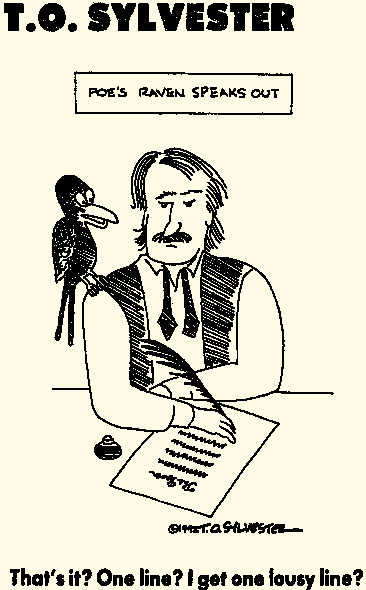Ravin' Evermore
Me, Po' Edgar, and The Ravin'

Quoth the
Raven, "Stop his ravin'!"
Quoth po' Edgar, "Nevermore!"
"Don't you know," implored the Raven
"That the man is misbehavin'?"
"Don't you know," replied po' Edgar
"That's what writer's work is for?""No!" objected Mr. Raven!
"Writin' ain't for misbehavin'!
It's for love, and lore, and more!
That's the thing that writin's for." "You're a bird brain" said po' Edgar
"It's too bad," continued Edgar
"That I ever wrote, demented,
of a bird so argumented
of an aviary scented
pesky argumentive bore!" "But you did," the bird insisted,
"And the pen can't be resisted!
I might be a little twisted,
But I'm here to stay and more!
Once the moving hand has written
And the pen has deeply bitten
And the mind with words are smitten
No one is the same no more!" | | At that point I tired
of waiting
For those two to start abating
All the chatter, all the baiting,
So I showed them to the door,
Where po' Edgar looked about 'im,
Wonderin' why the bird would doubt 'im,
And the bird just flew away.
I guess that he was kinda sore.
Edgar couldn't help but mutter
and I guess I wondered what're
They both hoping to accomplish?
What the hell were they here for?Now they're gone, but they inspired me,
Even though they finally tired me,
Just the same, they really wired me.
Think I'll write a little more.
Guess I'm not so bad. I might'r
might not be your favorite writer,
But I might be somewhat brighter
It would trigger my igniter,
Dedicate me to my chore,
If I got some little prize'r
Got extolled up to the skys'r
(Hoping that you're not a miser),
Got some cash like from a geyser.
I'd be grateful evermore. |

Dr. Doom
 | No observation, however simple,
can be made except by those predisposed to make it. Vry, in Helliconia Spring
by Brian W. Aldiss |

Poppa liked to tell the story of a particular cat. The cat was
owned by Dr. Adrean Spear, a Biology Professor at the University of Texas.
The cat was hit by a car and one of the cat's rear legs was paralyzed.
Dr. Spear had a friend who was a veterinarian, to whom he took the cat
for treatment. The veterinarian pronounced its doom. "We must,"
announced the veterinarian, "either amputate the injured leg or kill the
cat. The damaged nerve in its back won't regenerate."
Dr. Spear didn't want the cat to lose its leg and he kind of liked the
animal so he didn't want it killed, either. He also (privately) had
the suspicion that the nerve might, indeed, regenerate its damaged portion,
so he took the cat home. After several months, he noticed the cat
using the leg. He took the cat back to the veterinarian who said,
"Well, I'll be darned! I never saw that happen before!"
"Of course not!" said Dr. Spear. "You always either killed
the cat or cut off its leg!"
The story was an early lesson to me. I saw in it the possibility
that there are other choices than the ones presented. It taught me
that there's more than one way to skin a ca no, excuse me, there's more
than one way to look at things. Much later, I came to understand
that our choices are sometimes limited by design and to our detriment.
Eventually, I realized another implication of the story. A doctor
can't charge for a home cure.
 | Page 3 |
|


![]()

